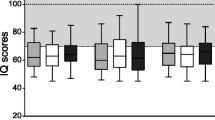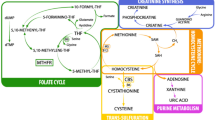Abstract
Long-term cognitive outcome and treatment of adult early treated (ET)PKU patients is a main issue in PKU research. We questioned whether the intellectual development of ETPKU patients is stable and to what extent its variation may be predicted by the quality of metabolic control. The aims of the present longitudinal retrospective study were to assess in young adult ETPKU patients: i) the relationship between IQ and metabolic control during the first two decades of life; and ii) the intra- and interindividual variability in the developmental trajectory which cannot be predicted by the disease’s biomarkers. We collected biochemical data from 65 ETPKU patients (diagnostic blood Phe > 360 μmol/l) who were assessed twice for IQ (Wechsler Intelligence Scale) during their lifetime (mean age: 10.2 and 19.6 years, respectively). Results show that in ETPKU patients IQ over the second decade of life remained stable in about half of the patients (51%); while the rest experienced a gain (7 to 15 points) or loss (7 to 28 points) in IQ scores (23 and 26% respectively) whatever the quality of metabolic control was. The main factor affecting the second IQ was the value of the first IQ (p < 0.000) whose effect overruled that of the markers of metabolic control. Looking at the developmental trajectory of our ETPKU patients, the present study disclosed a remarkable interindividual variability in their cognitive outcome and also an inconsistent linkage between cognitive performances and biochemical control, thus supporting the hypothesis of an individual resilience or vulnerability to Phe in young adult ETPKU.
Similar content being viewed by others
Notes
Critical difference (T2-T1) = zalpha*SDtest score*SQRT((1-rtt1) + (1-rtt2)); where: T1 and T2 = IQ total scores at time-point 1 and 2, respectively; zalpha = z-score (standard normal distribution) corresponding to alpha level (z0.05 = 1.96); SDtest score = standard deviation of the test score; rtt1 and rtt2 = test-retest reliability for T1 and T2, respectively.
References
Beasley MG, Costello PM, Smith I (1994) Outcome of treatment in young adults with phenylketonuria detected by routine neonatal screening between 1964 and 1971. Q J Med 87:155–160
Bilder DA, Burton BK, Coon H et al (2013) Psychiatric symptoms in adults with phenylketonuria. Mol Genet Metab 108:155–160
Blau N, van Spronsen FJ, Levy HL (2010) Phenylketonuria. Lancet 376:1417–1427
Crone MR, van Spronsen FJ, Oudshoorn K et al (2005) Behavioural factors related to metabolic control in patients with phenylketonuria. J Inherit Metab Dis 28:627–637
DeRoche K, Welsh M (2008) Twenty-five years of research on neurocognitive outcomes in early-treated phenylketonuria: intelligence and executive function. Dev Neuropsychol 33(4):474–504. https://doi.org/10.1080/87565640802101482
Hindley CB, Owen CF (1978) The extent of individual changes in I.Q. For ages between 6 months and 17 years, in a British longitudinal sample. J Child Psychol Psychiatry 19(4):329–350
Hindley CB, Owen CF (1979) An analysis of individual patterns of DQ and IQ curves from 6 months to 17 years. Br J Psychol 70:273–293
Holtzman NA, Kronmal RA, van Doorninck W, Azen C, Koch R (1986) Effect of age at loss of dietary control on intellectual performance and behavior of children with phenylketonuria. N Engl J Med 314(10):593–8
Hujibregts SC, de Sonneville LM, Licht R, van Spronsen FJ, Sergeant JA (2002) Short-term dietary interventions in children and adolescents with treated phenylketonuria: effects on neuropsychological outcome of a well-controlled population. J Inherit Metab Dis 25:419–430
Koch R, Azen CG, Friedman EG, Williamson ML (1982) Preliminary report on the effects of diet discontinuation in PKU. J Pediatr 100(6):870–875
Koch R, Burton B, Hoganson G et al (2002) Phenylketonuria in adulthood: a collaborative study. J Inherit Metab Dis 25:333–346
Leuzzi V, Mannarelli D, Manti F et al (2014) Age related psychophysiological vulnerabilità to phenylalanine in phenylketonuria. Front Pediatr 2:57. https://doi.org/10.3389/fped.2014.00057
Manti F, Nardecchia F, Chiarotti F, Carducci C, Carducci C, Leuzzi V (2016) Psychiatric disorders in adolescent and young adult patients with phenylketonuria. Mol Genet Metab 117(1):12–18. https://doi.org/10.1016/j.ymgme.2015.11.006
Mastrangelo M, Chiarotti F, Berillo L et al (2015) The outcome of white matter abnormalities in early treated phenylketonuric patients: a retrospective longitudinal long-term study. Mol Genet Metab 116(3):171–177. https://doi.org/10.1016/j.ymgme.2015.08.005
Menard S (1995) Applied logistic regression analysis: Sage University series on quantitative applications in the social sciences. Sage, Thousand Oaks
Moyle JJ, Fox AM, Arthur M, Bynevelt M, Burnett JR (2007) Meta-analysis of neuropsychological symptoms of adolescents and adults with PKU. Neuropsychol Rev 17:91–101
Nardecchia F, Manti F, Chiarotti F, Carducci C, Carducci C, Leuzzi V (2015) Neurocognitive and neuroimaging outcome of early treated young adult PKU patients: a longitudinal study. Mol Genet Metab 115(2–3):84–90
National Institutes of Health Consensus Development Panel (2001 Oct) National Institutes of Health consensus development conference statement: phenylketonuria: screening and management, October 16-18, 2000. Pediatrics 108(4):972–982
Palermo L, Geberhiwot T, MacDonald A, Limback E, Hall SK, Romani C (2017) Cognitive outcomes in early-treated adults with phenylketonuria (PKU): a comprehensive picture across domains. Neuropsychology 31:255–267
Ramus SJ, Forrest SM, Pitt DD, Cotton RG (1999) Genotype and intellectual phenotype in untreated phenylketonuria patients. Pediatr Res 45(4 Pt 1):474–481
Romano C, Balsamo A, Burroni M, Cardillo A, Carnevale F, Caruso U, Cerone R, Ciatti R, Cioni M, Corbetta C, Dotti L, Impellizzeri A, Lelli A, Leuzzi V, Lilliu F, Pagliardini S, Piazzi S, Principi R, Salardi S, Schiaffino MC (1997) Diagnosis, classification, basis of treatment of hyperphenylalaninemias. Riv Ital Ped 23:1040–1044
Romani C, Palermo L, MacDonald A, Limback E, Hall SK, Geberhiwot T (2017) The impact of phenylalanine levels on cognitive outcomes in adults with phenylketonuria: effects across tasks and developmental stages. Neuropsychology 31:242–254
Smith I, Beasley MG, Ades AE (1990) Intelligence and quality of dietary treatment in phenylketonuria. Arch Dis Child 65:311–316
Smith I, Beasley MG, Ades AE (1991) Effect on intelligence of relaxing the low phenylalanine diet in phenylketonuria. Arch Dis Child 66:311–316
Smith I, Wolff OH (1974) Natural history of phenylketonuria and influence of early treatment. Lancet 2(7880):540–544
Sullivan JE (2001) Emotional outcome of adolescents and young adults with early and continuously treated phenylketonuria. J Pediatr Psychol 26:477–484
Trefz FK, Cipcic-Schmidt S, Koch R (2000) Final intelligence in late treated patients with phenylketonuria. Eur J Pediatr 159(Suppl 2):S145–S148
van Spronsen FJ, Huijbregts SC, Bosch AM, Leuzzi V (2011) Cognitive, neurophysiological, neurological and psychosocial outcomes in early-treated PKU-patients: a start toward standardized outcome measurement across development. Mol Genet Metab 104:S45–S51. https://doi.org/10.1016/j.ymgme
van Spronsen FJ, van Wegberg AM, Ahring K et al (2017) Key European guidelines for the diagnosis and management of patients with phenylketonuria. Lancet Diabetes Endocrinol. https://doi.org/10.1016/S2213-8587(16)30320-5
Vockley J, Andersson HC, Antshel KM et al (2014) Phenylalanine hydroxylase deficiency: diagnosis and management guideline. Genet Med 16:188–200
Waisbren SE, Noel K, Fahrbach K et al (2007) Phenylalanine blood levels and clinical outcomes in phenylketonuria: a systematic literature review and meta-analysis. Mol Genet Metab 92:63–70
Walter JH, White FJ, Hall SK et al (2002) How practical are recommendations for dietary control in phenylketonuria? Lancet 360:55–57
Wechsler D (1997) Wechsler adult intelligence scale- revised (WAIS-R), New York, The Psychological Corporation, 1981. Italian version, C. Laicardi, A. Orsini, Scala di intelligenza Wechsler per adulti, Organizzazioni Speciali, Firenze
Wechsler D (2006) Wechsler intelligence scale for children III (WISC-III), New York, The Psychological Corporation, 1991. Italian version, A. Orsini, L. Picone, Scala di intelligenza Wechsler per bambini- terza edizione, Organizzazioni Speciali, Firenze
Wechsler D (1986) Wechsler intelligence scale for children Revived (WISC-R), New York, The Psychological Corporation, 1974. Italian version, V. Rubini, F. Padovani, Scala di intelligenza Wechsler per bambini- riveduta, Organizzazioni Speciali, Firenze
Weglage J, Fromm J, van Teeffelen-Heithoff A et al (2013) Neurocognitive functioning in adults with phenylketonuria: results of a long term study. Mol Genet Metab 110:S44–S48
Weglage J, Pietsch M, Denecke J, Sprinz A, Feldmann R, Grenzebach M, Ullrich K (1999) Regression of neuropsychological deficits in early-treated phenylketonurics during adolescence. J Inherit Metab Dis 22(6):693–705
Weglage J, Ullrich K, Pietsch M, Fünders B, Zass R, Koch HG (1996) Untreated non-phenylketonuric-hyperphenylalaninaemia: intellectual and neurological outcome. Eur J Pediatr 155(Suppl 1):S26–S28
Author information
Authors and Affiliations
Corresponding author
Ethics declarations
Conflict of interest
F. Manti, F. Nardecchia, S. Paci, F. Chiarotti, C. Carducci, C. Carducci, S. Dalmazzone, G. Cefalo, E. Salvatici, G. Banderali, and V. Leuzzi declare that they have no conflict of interest.
Informed consent
All procedures followed were in accordance with the ethical standards of the responsible committee on human experimentation (institutional and national) and with the Helsinki Declaration of 1975, as revised in 2013. Informed consent was obtained from all patients for being included in the study.
Additional information
Responsible Editor: Georg Hoffmann
Filippo Manti and Francesca Nardecchia wish it to be known that, in their opinion, the first two authors should be regarded as joint First Authors
Electronic supplementary material
Table S1
(DOCX 26 kb)
Rights and permissions
About this article
Cite this article
Manti, F., Nardecchia, F., Paci, S. et al. Predictability and inconsistencies in the cognitive outcome of early treated PKU patients. J Inherit Metab Dis 40, 793–799 (2017). https://doi.org/10.1007/s10545-017-0082-y
Received:
Revised:
Accepted:
Published:
Issue Date:
DOI: https://doi.org/10.1007/s10545-017-0082-y




